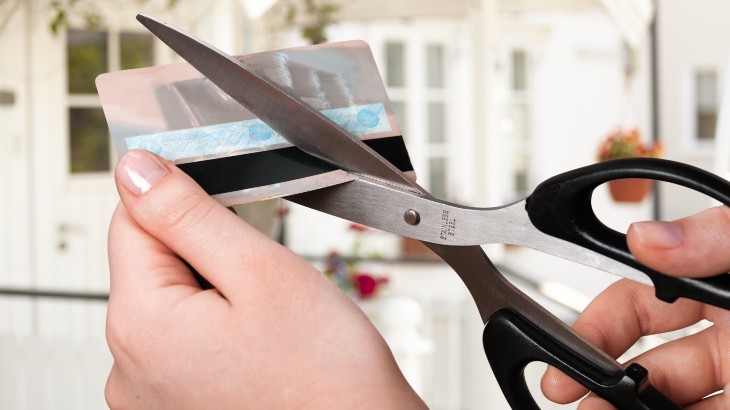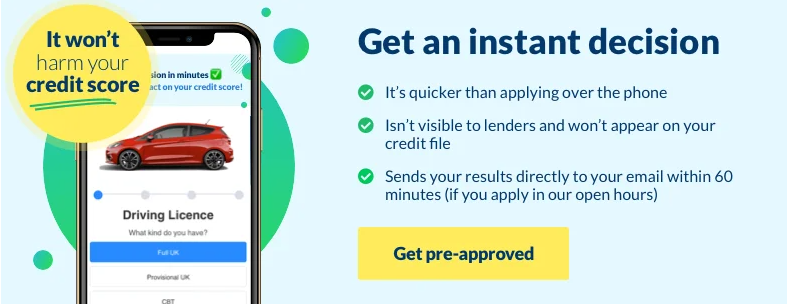Once you’ve made that final payment on your credit card, you may be questioning whether you should leave your account open or close it once and for all.
And there are some good reasons for closing it.
If you’ve worked hard to pay off your balance, you may not want to be tempted to use the card again.
Perhaps you feel like you simply have too many and want to minimise the number of accounts you have to juggle.
Or maybe you simply have a better deal with your new credit card.
But if you’re thinking about applying for car finance in the near future, think carefully, because closing your credit card account could actually have an impact on your credit score.
Credit cards and your credit score

Your credit score is the number lenders look at to assess the likelihood of you paying credit back. It’s made up from your credit history and shows the level of risk you pose as a borrower.
If you’ve managed your finances well and payments on time, your score will be higher. And a higher score means a better chance of being accepted for car finance at the most competitive rates.
As your credit score is all about predicting your future behaviour, how you’ve used your credit card in the past can really affect your score.
So, if you’ve had your card for many years and regularly paid off the balance on time, it’ll reflect well upon your score.
How closing a credit card will affect your credit score
As your credit cards play a key role in determining your score, closing a card can affect it in a number of ways.
Credit utilisation
One big factor that plays a part in determining your score is credit utilisation. This is basically how much credit you have available compared to how much you use.
So if your credit card limit was £1,000 and you had a balance of £300, your credit utilisation would be 30%.
A lower credit utilisation will always be better for your credit score.
When you close a credit card, you lose the amount of credit available to you, while your debt stays the same. This means your credit utilisation ratio can go up and your score can go down.
Example:
In this scenario, your overall credit utilisation is 50%
| Credit available | Credit utilisation | |
| Credit card 1 | £1,000 | £1,000 |
| Credit card 2 | £1,000 | £500 |
| Credit card 3 | £1,000 | £0 |
| Total | £3,000 | £1,500 (50%) |
Let’s look at what happens if you close credit card 3.
| Credit available | Credit utilisation | |
| Credit card 1 | £1,000 | £1,000 |
| Credit card 2 | £1,000 | £500 |
| Total | £2,000 | £1,500 (75%) |
As the amount of debt has stayed the same, your credit utilisation would have shot up to 75%, and this would be reflected negatively in your score.
Age of the account
Something else to consider is the age of the credit card. When looking at your credit report, lenders like to see a history of responsible borrowing over a long period of time.
It shows you’re a reliable borrower, more likely to repay, and in turn, this increases your chances of getting car finance.
If you cancel a credit card that you’ve had for years, it could lower the average age of your accounts and, although it may not affect your credit score immediately, may reflect poorly on your report.
Amount of credit on your report
The number of accounts listed on your report also matters. If this is your one and only credit account, by cancelling it, you’ll leave yourself with a thinner file and possibly a lower score.
It essentially means lenders won’t have enough information to be able to accurately assess the risk of lending to you.
Does cancelling a credit card ever make sense?

Yes, absolutely. Your credit score shouldn’t be the only thing you think of when deciding whether you should cancel your credit card or not.
Some credit cards have monthly fees to use their reward programmes, so if you’re no longer using the card and the cost of keeping it outweighs the benefits, it’s best to close it.
Cancelling a credit card can also remove the temptation of spending on it – especially if you’re trying to get out of debt and improve your finances.
Finally, a credit card that you’re not using frequently could be more susceptible to fraud, simply because you’re not keeping an eye on it.
Any impact on your credit score is usually short-lived and there are ways and means of building your score up again.
So, if closing your credit card account makes more sense, then it’s ok to let it go.
Is there a reason you should keep your credit card?
If you’re thinking of applying for car finance soon, closing your credit card could negatively impact your score.
So if any of the following apply, it’s probably best to keep it open for now:
- It’s your oldest card
- Closing it would make the percentage of your credit utilisation increase
- You don’t have a lot of other credit accounts on your report
- You have a history of good repayments on the account
What’s the right way to close your credit card account?

Once you’ve ascertained that closing your account won’t have a negative impact on your credit report, here are the steps to take to close your credit card safely:
Pay off your balance
If your credit card has an outstanding balance, you won’t be able to close the account.
If you’re struggling to pay off the balance due to interest rates, speak to your provider to see if they can help.
Or alternatively, look into transferring the balance to a lower interest rate card before closing the account.
Speak to your provider
While you can typically close an account online, it’s good practice to give your credit card provider a quick call first just to ensure there are no pending transactions or outstanding fees you’re unaware of.
Put it in writing
If you’re not closing your account online, send a written notice by registered post to your provider with the request to close the account, along with your name and account number.
Once your card has been cancelled, you’ll receive confirmation that the account has been closed. Keep this confirmation notice in case you ever need it in the future.
Alternatives to closing a credit card without hurting your score
There are several options other than closing your credit card, so you can get what you want out of it and keep your credit score healthy.
Keep the account open
If there’s no annual fee and you’re not tempted to spend on it, you could simply keep your account open.
If you use the card and pay the full balance back monthly, it could even improve your score.
Downgrade your account
You may want to close your card due to a fee on the account for particular rewards.
In this instance, you could speak to your provider about downgrading the account, keeping the same number and credit history while getting rid of the fee, so there’s no impact on your score.
Ask about a better offer
If you don’t ask, you don’t get. So if you’ve seen another card with better rewards or benefits, why not ask your current provider what they can offer you for staying with them?
After you close your credit card
If you’ve decided it’s best to close your credit card account for good, be mindful that it could temporarily affect your credit score.
It’s always good to keep a close eye on your credit report anyway, particularly when you’ve made any changes.
If your score does go down once you’ve closed your account, you can look at ways to improve it, such as lowering your credit utilisation.
READ: Top 5 tips to boost your credit score
Ready to apply?
If after reading this you think you’re ready to apply for car finance, you can find out in minutes whether you’ll be approved without affecting your credit score:














